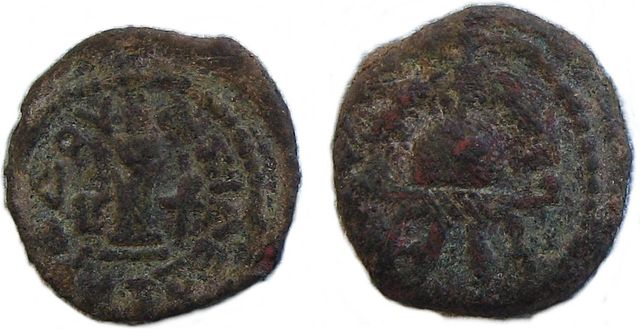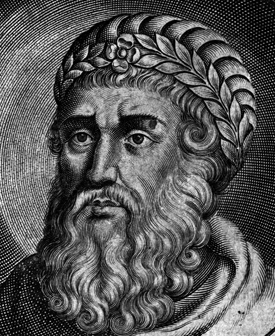热门问题
时间线
聊天
视角
大希律王
来自维基百科,自由的百科全书
Remove ads
希律(希伯来语:הוֹרְדוֹס,古希腊语:Ἡρῴδης,英语:Herod,前74年—前4年),又译希律王、黑落德王,亦被称为大希律王(Herod the Great)、希律大帝,希律一世(Herod I),希律王朝的首位国王,是罗马共和国(公元前27年起成为罗马帝国)境内作为自治国的希律犹太王国的犹太王。
此条目需要补充更多来源。 (2016年6月17日) |


他是犹太历史上最著名的建设者,他扩建了耶路撒冷的第二圣殿(又称希律的圣殿)—西墙是其中的一部分,修建了凯撒利亚的港口,建立马萨达、安东尼亚堡垒与希律宫(Herodium)的城墙。他的生平资料主要来自于公元1世纪犹大史学家弗拉维奥·约瑟夫斯的著作。[2]
希律王也出现在基督教《新约圣经》马太福音中,作为犹太地统治者在耶稣诞生时下令罗马驻军将伯利恒及其周围境内两岁以下的所有男婴杀死,尽管大多数希律王传记作者并不相信这一事件发生过。根据国家地理杂志的研究报导除了圣经之外并无其他历史资料纪录这件大量杀死婴儿的事件[3]。然而当时的伯利恒乃一小村庄,两岁以下男婴的数量可能不超过二十,这也许是为何这起事件缺乏史料记载的原因[4]。尽管他取得了成功,包括从几乎一无所有中一手打造了一个新王朝[5],他仍然受到了各种历史学家的批评。历史学家对他的统治意见两极化,有些人认为他的遗产是成功的证据,有些人则认为这是对他残暴统治的提醒。[2]
Remove ads
生平
希律生于以东[6],是哈斯蒙尼王朝“大祭司”(国王)约翰·海卡努斯二世身边的亲罗马权臣安提帕特的其中一位儿子,希律的母亲塞浦路斯是一名纳巴泰(今约旦)人的阿拉伯公主。父亲安提帕特是以东人,母亲则是犹太人并且他的祖先早已皈依犹太教,所以希律自小就作为犹太人长大。[7][8][9][10][11][12]
希律的崛起很大程度上是通过他父亲和罗马共和国前三头同盟之一的尤利乌斯·凯撒(亦是后来罗马皇帝屋大维的养父,血缘上屋大维是凯撒的外甥)的良好关系,因此受凯撒的信任,更将犹太的公共事务委托给安提帕特。[13]公元前47年,希律被任命为加利利省长,当时希律大约25岁或28岁(希腊文原文:“15 岁”)。[14]在那里,他忠诚地为共和国元老院征收该地区的税收,并成功地消灭了该地区的强盗。[15][16]他很享受罗马人的支持,但犹太公会谴责他的暴行。[17]当希律还是个普通人时,他就决定惩罚哈斯蒙尼大祭司(国王)海卡努斯二世,后者曾因谋杀罪传唤希律受审,但由于他父亲安提帕特和哥哥法萨尔的干预,希律未能这样做。

公元前41年,罗马共和国后三头同盟之一的马克·安东尼任命希律和他的哥哥法撒尔为分封王,他们被安排担任分封王是为了支持海卡努斯二世。公元前40年,海卡努斯二世的侄子安提柯二世在帕提亚帝国的帮助下从他的叔叔手中夺取了犹太王位。希律逃往罗马城,恳求共和国复辟海卡努斯二世。罗马人对犹太地区有着特殊的兴趣,因为他们著名的庞贝将军于公元前63年征服了哈斯蒙尼王朝和耶路撒冷,从而使哈斯蒙尼王朝成为罗马附属国。在罗马,希律出乎意料地被元老院任命为犹太人的王[18],世称大希律王。
希律和罗马叙利亚总督索西乌斯在安东尼的要求下,于公元前37年率领大军出发,占领了耶路撒冷,希律随后将末代哈斯蒙尼王朝国王安提柯二世送去被安东尼处决。[19]从这一刻起,希律成为犹太的唯一统治者,并获得了巴西勒斯(Βασιλεύς,“国王”)的头衔,开创了希律王朝,结束了马加比家族的哈斯蒙尼王朝。
由于有些人认为希律王的家人皈依了犹太教,他的宗教信仰受到了犹太社会一些人士的质疑。[20]当约翰·海卡努斯的哈斯蒙尼王朝在公元前140-130年征服以土买地区(希伯来圣经中的以东)时,他要求所有以土买人遵守犹太法律,否则就离开;大多数以土买人因此皈依了犹太教,这意味着他们必须接受割礼,[21]并且许多人与犹太人通婚并接受了他们的习俗。[22]虽然希律王公开表明自己是犹太人,并且被一些人认为是犹太人,[23]但这种宗教身份被希律党人颓废的生活方式所破坏,这会让他们招致虔诚的犹太人的反感。[24]

希律后来处决了他自己的几名家庭成员,包括他的妻子米利暗一世。[12]
希律王和罗马帝国的开国皇帝奥古斯都(屋大维)之间的关系表明神化的皇帝和统治犹太人及其圣地的国王之间的脆弱政治。当他们互动时,希律王既要满足他王国中的犹太人和非犹太人的愿望,又必须满足奥古斯都在整个帝国传播罗马文化、建筑和价值观的目标。奥古斯都和罗马帝国对政策的影响导致整个希律王国都采用古罗马建筑。希律为了效忠罗马而对犹太地区进行建筑扩张的一个例子可以从他委托建造的第三座圣殿—奥古斯都圣殿中供奉奥古斯都的圣殿中看出。[25]
希律晚年因儿子夺位而非常烦恼。最后希律王在杰里科病逝,至此他已统治以色列地区37年。死后葬在圣城以外12公里的希律堡,其后按照罗马帝国皇帝奥古斯都分封,三名儿子希律·阿基劳斯、希律·安提帕斯和希律·菲利普二世,另外还有希律的妹妹莎乐美一世分了他的领土。
领有包含耶路撒冷在内的犹太地、以东和撒马利亚封地的希律·阿基劳斯因为残暴统治,在公元6年被奥古斯都罢免,他的领土随后被罗马直接派罗马人长官/总督管理,成为了“犹太行省”。
Remove ads
最为熟悉是他在马太福音第二章的作为。他是耶稣童年时代整个犹太人地区的统治者。
在《新约圣经》中,他知道伯利恒有个君王诞生了,就让三智者先行,假意跟随朝拜。当三智者从另一方向离开后,他下令罗马驻军将伯利恒及其周围境内两岁以下的所有男婴杀死,而耶稣一家在其死后才回到拿撒勒。
家庭
与多洛梅(Dorimne)或者叫多莉丝(Doris):大希律的第一任妻子
- 安提帕特(Antipater): 大希律的长子,出生于大约公元前46年。公元前4年,安提帕特因阴谋罪被罗马皇帝奥古斯都判处死刑。
与米利暗一世:大希律的第二任妻子,有皇室血统,来自犹太王室马加比家族。
- 亚历山大(Alexander): 因被怀疑密谋反叛,被下令处决,这一事件发生在公元前7年左右。
- 阿里斯托布鲁斯: 因被怀疑密谋反叛,被下令处决,这一事件发生在公元前7年左右。他只有一位妻子贝狄卡(Berenice),所生的女儿名叫(Salome)和(Herodias)。
与米利暗二世:大希律的第三任妻子。
与玛塔色:大希律的第四任妻子。
- 希律·阿基劳斯: 被分封为撒马利亚、犹太和伯利恒的分封王。他秉性残暴,犹如其父大希律。又娶了同父异母的兄弟亚力山大(Alexander)的遗孀格拉菲拉(Glaphyra)为妻。在主后12年被废黜,流放到高卢,后死在那里。此后,犹太地变成了罗马的一个省份,由罗马皇帝委任的巡抚管治。
- 希律·安提帕斯: 被分封为加利利和低加利利的分封王。爱上了希律二世的妻子希罗底,正式娶希罗底为妻。受到施洗约翰的指责,将约翰砍头。
与耶路撒冷的克丽奥佩脱拉(Cleopatra):大希律的第五任妻子。
与帕拉斯(Pallas):
- 法萨尔(Phasael)
与法伊德鲁(Phaidra):
- 罗克珊(Roxanne):
与埃尔皮斯(Elpis):
- 莎乐美二世 (Salome II)
与佚名妻子:
- 一个女性亲戚
- 一个侄女
莎拉姆西奥公主(Salampsio Princess): 通常被认为是大希律的女儿,但关于她的生平和身份仍然存在一些历史争议。
奥林匹亚斯(Olympias Herodian)可能是大希律和玛塔色所生的女儿,尚需更多史料进一步证实。
妹妹莎乐美一世: 大希律死后,统治犹地亚西南部的一处沿海地方,包括阿夫内(Iturea)、阿什杜德和内陆的法萨伊勒(Fasayil)。
参考文献
Wikiwand - on
Seamless Wikipedia browsing. On steroids.
Remove ads

